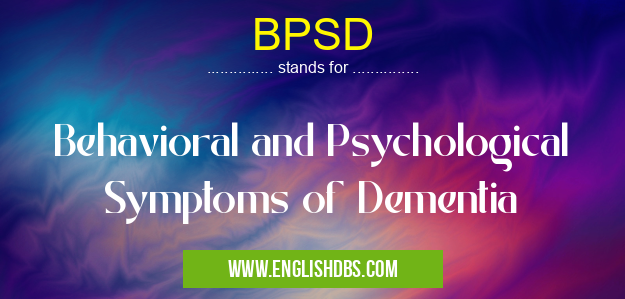What does BPSD mean in PSYCHOLOGY
Behavioral and Psychological Symptoms of Dementia (BPSD) is a collection of psychological difficulties experienced by individuals with degenerative dementias such as Alzheimer's disease. These symptoms are characterized by changes in behavior, personality, and cognitive functioning. BPSD can present both positive and negative behaviors, with some symptoms being more common than others. These psychological symptoms often lead to an overall decline in quality of life for the individual and the caregivers who care for them. It is important to note that these symptoms may vary in severity depending on the person and the stage of dementia they are experiencing.

BPSD meaning in Psychology in Academic & Science
BPSD mostly used in an acronym Psychology in Category Academic & Science that means Behavioral and Psychological Symptoms of Dementia
Shorthand: BPSD,
Full Form: Behavioral and Psychological Symptoms of Dementia
For more information of "Behavioral and Psychological Symptoms of Dementia", see the section below.
Meaning
BPSD stands for Behavioral and Psychological Symptoms of Dementia, which refer to a wide range of different behavioral changes associated with dementia. This includes alterations in mood, thought processes, social interactions, communication abilities, memory formation, decision-making abilities, and physical function. These symptoms can manifest as aggression, agitation, depression or irritability among other cognitive and behavioral decline. Memory loss is also common among those suffering from BPSD which can interfere with daily activities like shopping or driving a car.
Full Form
The full form of BPSD is Behavioral and Psychological Symptoms of Dementia which describes the different kinds of difficulties faced by people diagnosed with this condition. The term encompasses symptoms like a loss in motor or verbal skills as well as changes in personality and behavior ranging from agitation to rage outbursts or even delusions. Those who display these signs may be unable to think clearly or express themselves verbally due to their mental state changes resulting from their condition.
Essential Questions and Answers on Behavioral and Psychological Symptoms of Dementia in "SCIENCE»PSYCHOLOGY"
What is Behavioral and Psychological Symptoms of Dementia (BPSD)?
Behavioral and Psychological Symptoms of Dementia (BPSD) refers to behavioral changes that are associated with dementia, such as depression, mood swings, aggression, restlessness, delusions or paranoia. These symptoms tend to worsen over time and can affect a person’s ability to carry out activities of daily living.
What are the causes of BPSD?
BPSD can have multiple causes, including changes in a person’s environment or their physical health. It can also be caused by underlying medical conditions such as Alzheimer’s disease and other forms of dementia.
How do I recognize signs of BPSD?
Signs of BPSD may include depression, agitation, denial/inability to accept reality, disinterest in previously enjoyed activities, restlessness, increased anger or aggression and decrease in motivation.
How is BPSD diagnosed?
A diagnosis for BPSD is typically done through clinical interviews and assessments with the patient as well as input from family members or caregivers who may be able to provide observations about the patient's behavior at home. In some cases data from physical exams such as brain scans may also be useful for diagnosis.
What types of treatments are available for BPSD?
There are a variety of treatment options available for treating BPSD depending on the underlying cause. Non-pharmaceutical interventions may include environmental modifications or stimulating activities; whereas pharmaceutical options such as anti-psychotic medications can also help reduce symptoms.
Is there anything I can do to prevent symptoms of BPSD?
While there is no ‘cure’ for dementia or BPSD; there are several lifestyle modifications you can make that could potentially slow cognitive decline and/or help prevent the onset of certain behaviors associated with dementia such as staying physically active and eating a balanced diet rich in antioxidants. Cognitive stimulation activities may also help improve functioning skills related to everyday tasks like problem solving and memory recall.
Are there any long-term effects associated with BPSD?
Over time individuals suffering from BPSD may have difficulty carrying out tasks they used to do easily which could lead to further complications down the line if not managed properly. Long term care specifically tailored to meet their needs may become necessary if they continue deteriorating (e.g., need for placement in nursing home).
Who should I contact if I think someone is exhibiting signs of BPSD?
If you suspect someone close to you has begun exhibiting signs consistent with those associated with dementia it's important you speak with your primary care physician right away so further evaluation can take place in order determine what course of action is best suited for them.
Is online counseling available for those dealing with a loved one experiencing BPDS?
Yes! Online counseling services offer individuals an opportunity to seek mental health support from home especially during this pandemic period where most people have limited access to physical therapy options due to lockdowns and social distancing restrictions.
Final Words:
Behavioral and Psychological Symptoms of Dementia (BPSD) is a collection of psychological difficulties experienced by individuals with degenerative dementias such as Alzheimer's disease. These psychological symptoms cause significant distress for patients and can make it difficult for them perform daily tasks necessary to maintain their independence or care for themselves without assistance from others. Treatment options exist for those suffering from BPSD including medications that help manage behavioral issues as well as psychotherapeutic interventions that work best when combined with supportive family members who are able to understand the emotional impact this condition has on them.
BPSD also stands for: |
|
| All stands for BPSD |
